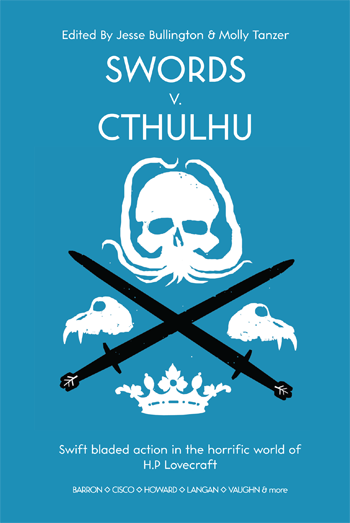First, some music
It’s a wonderful bonus that Alistair Rennie‘s debut novel BleakWarrior has its own soundtrack, composed by the author himself, which you should definitely check out and listen to while you leaf through his gloriously crafted sledgehammer of a book. But for the purposes of this review, I propose the following piece of music to set the tone. I trust it will soon become clear why this selection was made.
New Weird or weird-weird?
There is an argument to be made for Alistair Rennie’s work slotting in rather neatly into the improvised sub-genre labelled ‘The New Weird’. After all his short story, ‘The Gutter Sees The Light That Never Shines’ was the only original entry in Ann and Jeff VanderMeer’s anthology The New Weird (2008), where it was presented as a sort of laboratory experiment of what’s to come — if anything is to come at all — for the genre under discussion, celebration and dissection.
Well, reams could perhaps be written about the ins-and-outs of the New Weird itself (for my part, I wrote something of a middling MA dissertation on the subject) but thankfully, Rennie went ahead and developed the germ of what lay in the original short story into a head-bangingly bizarre novel, BleakWarrior, released earlier this year from Blood Bound Books.
Weaving in yet another short story pertaining to the same (secondary) world, which was also published under Ann Vandermeer’s watch during her all-too-brief and unceremoniously interrupted spearheading of Weird Tales, Rennie’s novel does boast a general thrust towards weirdness — but whether said weirdness can be pinned to the aesthetics of any particular genre is another thing entirely.

BleakWarrior by Alistair Rennie (Blood Bound Books, 2016). Cover illustration by Maxwell John Hudetz
BleakWarrior may resemble a superhero name — and he may have the abilities that vaguely match some superheroes — but the protagonist who wields it in Rennie’s novel has no alter ego. Neither do his erstwhile colleagues who populate the rather high-strung planet Rennie has concocted. In fact they boast names like Automanic, Gutter and The Light That Never Shines.
And their main mission in life is to obliterate each other with no rhyme or reason. Who needs alter egos, who needs a private life and relaxation time when endowed with such a single-minded mission? (That’s for the ‘Linear’ beings, not the ‘Meta-Warriors’ we’re concerned with right here.)
I’ll get to the main plot motor in a moment, but I’d like to dwell on this for second, because it’s important.
What Rennie captures so well is the hedonistic and atavistic thrill of having just such a brutal sense of purpose in life. The knife’s edge walk between creation and destruction — more to the point, between sex and violence — is what Rennie appears to be insatiably obsessed with. The inexorable churn of brutality that these characters engage in feels both inevitable and — operating within the hellish logic that Rennie sets up — strangely beautiful.
In lesser hands this would have felt like an adolescent indulgence: an exercise in attention-grabbing antics to an audience of lobotomised gore-hounds and their scandalised elders.
But then, the kicker.
You see, BleakWarrior suddenly grows tired of killing people without knowing the reason why. So begins his quest; which will of course be punctuated by blood and thunder — and blood and guts — while also being placed in direct parallel to that of The Sisters of No Mercy (their name a hint at yet another aesthetic fetish that Rennie very much gives vent to in the novel’s make-up): two expert warriors slashing and fucking their way through an organ-retrieving mission in the hopes of revitalising their dearly-departed ‘Middle Sister’.
This allows Rennie to have the cake and eat it too — an often-frustrated adolescent indulgence now given full vent. By placing a philosophical conundrum at the very centre of this monstrous clusterfuck, Rennie asks you to pay attention, all the while bending your mind with the very nature of this juxtaposition. Rennie has written eloquently on what makes the Sword & Sorcery genre so special, and BleakWarrior’s amoral world of violent supermen and women out for nothing but more violence certainly evokes that genre to some degree.
But the kicker kicks it all into crazy town. Since this is a book better experienced than explained, here’s a few extracts to give you an idea of what I’m talking about:
Whorefrost’s cock is long and thin with a remarkably bulbous head that makes it look like a bauble on the end of a stick. His testicles are disproportionately large and, like the rest of his body, hairless. More to the point, his egg-sac is teeming with semen that has an unusual potency: it is deadly cold and, to this extent, biologically devastating.
Humidity hung to the Fetid Mountains like a lubricant. The slopes were thick with an organic welter of sprawling variations of fecundity and decay. There was an aura of prototypical distinction between emergent species that took the principle of diversification to extremes that hardly seemed worth the bother.
…But what was most alluring in the appeal of the girl whose name they didn’t know was the potency of her vaginal juices that spilled over the lips of The Sisters of No Mercy with a sublime and syrupy thickness that seemed to fill their brains with infusions of erotic wonder. The taste had a weighty tang that produced an effect of mild invigoration mixed with a prolonged sense of internal melting, like being absorbed by the outer shades of a celestial aurora.
Notice how the perfectly sculpted — and it must be said, somewhat arch and archaic — prose serves as a jolting cymbal crash when combined with the XXX-rated stuff under consideration? Of course, it’s also funny, which feature Rennie exploits to full effect.
Yeah. This shit will fuck you up.
Hail, Dionysus
BleakWarrior is literature to the Nth degree. It’s a work by someone who is hopelessly infatuated with the ‘lower’ genres but whose love and enthusiasm for them is filtered through a mature intelligence and a respect for and knowledge of the art of fiction. The obvious clue of the ‘Meta’-Warriors gives that detached postmodern element to all the craziness.
In fact, this is a novel that gets its animating friction from the simple fact that it’s at constant war with itself. It’s a novel chock-a-block with one sensationalist set piece after another — a Jacobean display of torture porn Grand Guignol that will serve as a benchmark for prose brutality for years to come — but that’s delivered through a strong narratorial voice with no interest in simply remaining in the gutter (with the Gutter). Instead Rennie wrings the experience for all that it’s worth, making sure to play with ideas as well as bodies.
But gods damn it, what will remain etched in your brain is the images. The voice will only help you take them seriously as part of an interesting new project in genre writing. One that will hopefully spawn a plethora of imitators — to say nothing of more, more, more from Rennie himself, hopefully — which will grow over the literary terrain like rancid but glorious fungus.
For BleakWarrior is a a child of Dionysus filtered through the voice of Apollo… until you realise that it’s not Apollo at all, but a trickster god the likes of which we haven’t seen before.
In short…
This shit will fuck you up.


